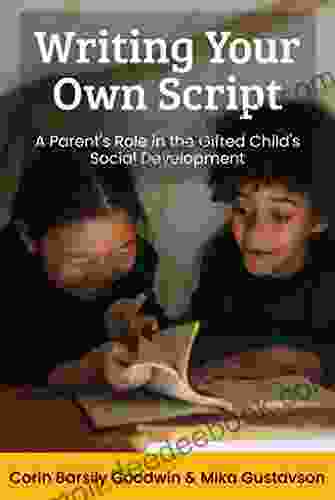The Comprehensive Guide to Writing Your Own Script

5 out of 5
| Language | : | English |
| File size | : | 744 KB |
| Text-to-Speech | : | Enabled |
| Screen Reader | : | Supported |
| Enhanced typesetting | : | Enabled |
| Word Wise | : | Enabled |
| Print length | : | 101 pages |
| Lending | : | Enabled |
| Paperback | : | 176 pages |
| Item Weight | : | 14.22 pounds |
Have you always dreamed of writing your own movie or television script? If so, you're in luck! Screenwriting is a challenging but rewarding endeavor that can lead to a successful career in the entertainment industry.
But where do you start? How do you turn your ideas into a compelling and well-written script?
This comprehensive guide will teach you everything you need to know about the screenwriting process, from outlining to formatting. By the end of this guide, you'll have the skills and knowledge you need to write your own script and start your journey towards becoming a successful screenwriter.
Step 1: Outline Your Script
The first step in writing a script is to outline your story. An outline is a roadmap that will help you stay on track and avoid getting lost in the writing process.
Your outline should include the following elements:
- Logline: A one-sentence summary of your story.
- Synopsis: A brief overview of your story, including the main characters, setting, and plot.
- Character sketches: A brief description of each of your main characters, including their motivations, goals, and conflicts.
- Plot outline: A detailed outline of your story, including the beginning, middle, and end.
Once you have a solid outline, you're ready to start writing your script.
Step 2: Write Your First Draft
Now it's time to start writing your first draft. Don't worry about being perfect at this stage; just focus on getting your ideas down on paper (or on your computer screen).
As you write, keep the following tips in mind:
- Use a standard screenwriting format. This will make your script easier to read and understand.
- Write in a clear and concise style. Avoid using jargon or unnecessarily complex language.
- Focus on telling a compelling story. Your script should be engaging and entertaining from beginning to end.
Once you have a complete first draft, take a break from it for a few days. Then come back to it with fresh eyes and start revising.
Step 3: Revise and Rewrite
The revision process is essential for improving the quality of your script. As you revise, look for ways to:
- Strengthen your story. Make sure that your plot is well-paced and that your characters are well-developed.
- Improve your dialogue. Make sure that your dialogue is natural and believable.
- Tighten your writing. Cut any unnecessary scenes or dialogue.
Once you're satisfied with your revisions, you're ready to start formatting your script.
Step 4: Format Your Script
Properly formatting your script is essential for making it look professional and easy to read. Here are some basic formatting guidelines:
- Use a standard font. Courier or Times New Roman are both good choices.
- Set the margins to 1 inch on all sides.
- Use a 12-point font size.
- Double-space your lines.
- Indent dialogue by 1 inch.
- Use scene headings to break up your script.
You can also use screenwriting software to help you format your script. Software such as Final Draft and Fade In can make the formatting process much easier.
Step 5: Get Feedback
Once you've finished formatting your script, it's time to get feedback from others. This is a crucial step in the writing process, as it will help you identify areas that need improvement.
Here are some ways to get feedback on your script:
- Join a writing group. This is a great way to get feedback from other writers.
- Hire a script consultant. A script consultant can provide you with professional feedback on your script.
- Enter your script in a contest. This is a great way to get feedback from industry professionals.
Be open to feedback, and use it to improve your script.
Writing a script is a challenging but rewarding endeavor. By following the steps outlined in this guide, you can write a compelling and well-written script that will impress producers and directors.
So what are you waiting for? Start writing your script today!

5 out of 5
| Language | : | English |
| File size | : | 744 KB |
| Text-to-Speech | : | Enabled |
| Screen Reader | : | Supported |
| Enhanced typesetting | : | Enabled |
| Word Wise | : | Enabled |
| Print length | : | 101 pages |
| Lending | : | Enabled |
| Paperback | : | 176 pages |
| Item Weight | : | 14.22 pounds |
Do you want to contribute by writing guest posts on this blog?
Please contact us and send us a resume of previous articles that you have written.
 Novel
Novel Chapter
Chapter Text
Text Story
Story Genre
Genre Reader
Reader Paragraph
Paragraph Shelf
Shelf Glossary
Glossary Bibliography
Bibliography Foreword
Foreword Preface
Preface Synopsis
Synopsis Footnote
Footnote Manuscript
Manuscript Scroll
Scroll Codex
Codex Bestseller
Bestseller Classics
Classics Narrative
Narrative Biography
Biography Autobiography
Autobiography Memoir
Memoir Encyclopedia
Encyclopedia Thesaurus
Thesaurus Character
Character Librarian
Librarian Catalog
Catalog Stacks
Stacks Archives
Archives Study
Study Scholarly
Scholarly Journals
Journals Special Collections
Special Collections Study Group
Study Group Dissertation
Dissertation Storytelling
Storytelling Reading List
Reading List Theory
Theory Textbooks
Textbooks Stephen Saxton
Stephen Saxton Steven Pressfield
Steven Pressfield Christopher Dickey
Christopher Dickey Henry James
Henry James Willa Reece
Willa Reece Marques Lewis
Marques Lewis Peter Sloterdijk
Peter Sloterdijk Howard Mandel
Howard Mandel Alice Childress
Alice Childress Jim Ody
Jim Ody Dennis Prager
Dennis Prager Fred Chappell
Fred Chappell John Philip
John Philip Palmer Jones
Palmer Jones Barry Hollembeak
Barry Hollembeak Morton Manus
Morton Manus Christopher B Balme
Christopher B Balme Katherine Hastings
Katherine Hastings Daytona Watterson
Daytona Watterson Patricia Polacco
Patricia Polacco
Light bulbAdvertise smarter! Our strategic ad space ensures maximum exposure. Reserve your spot today!

 Natsume SōsekiNavigating the Labyrinth: The Intricate Dilemmas of Global Gender Politics in...
Natsume SōsekiNavigating the Labyrinth: The Intricate Dilemmas of Global Gender Politics in...
 Nathaniel PowellInternet of Things and Ubiquitous Artificial Intelligence: The Dawn of a New...
Nathaniel PowellInternet of Things and Ubiquitous Artificial Intelligence: The Dawn of a New...
 Abe MitchellQuantum Computing: From Colossus to Qubits - A Journey into the Quantum Realm
Abe MitchellQuantum Computing: From Colossus to Qubits - A Journey into the Quantum Realm J.R.R. TolkienFollow ·8.4k
J.R.R. TolkienFollow ·8.4k Evan SimmonsFollow ·4.3k
Evan SimmonsFollow ·4.3k Tony CarterFollow ·9.4k
Tony CarterFollow ·9.4k Rick NelsonFollow ·14.6k
Rick NelsonFollow ·14.6k Kelly BlairFollow ·9.4k
Kelly BlairFollow ·9.4k Easton PowellFollow ·16.3k
Easton PowellFollow ·16.3k Emilio CoxFollow ·18.8k
Emilio CoxFollow ·18.8k Xavier BellFollow ·18.7k
Xavier BellFollow ·18.7k

 Vernon Blair
Vernon BlairHow to Get a Woman to Pay for You: A Comprehensive Guide...
In the modern dating...

 Levi Powell
Levi PowellPrinciples and Theory for Data Mining and Machine...
Data mining and machine learning are two...

 Andrew Bell
Andrew BellMirrors For The Mind: Milestones In Discovery And...
Mirrors have been a part of human history...

 Alec Hayes
Alec HayesDelving into Natural Language Processing with Java and...
Natural Language Processing (NLP) is an...
5 out of 5
| Language | : | English |
| File size | : | 744 KB |
| Text-to-Speech | : | Enabled |
| Screen Reader | : | Supported |
| Enhanced typesetting | : | Enabled |
| Word Wise | : | Enabled |
| Print length | : | 101 pages |
| Lending | : | Enabled |
| Paperback | : | 176 pages |
| Item Weight | : | 14.22 pounds |










